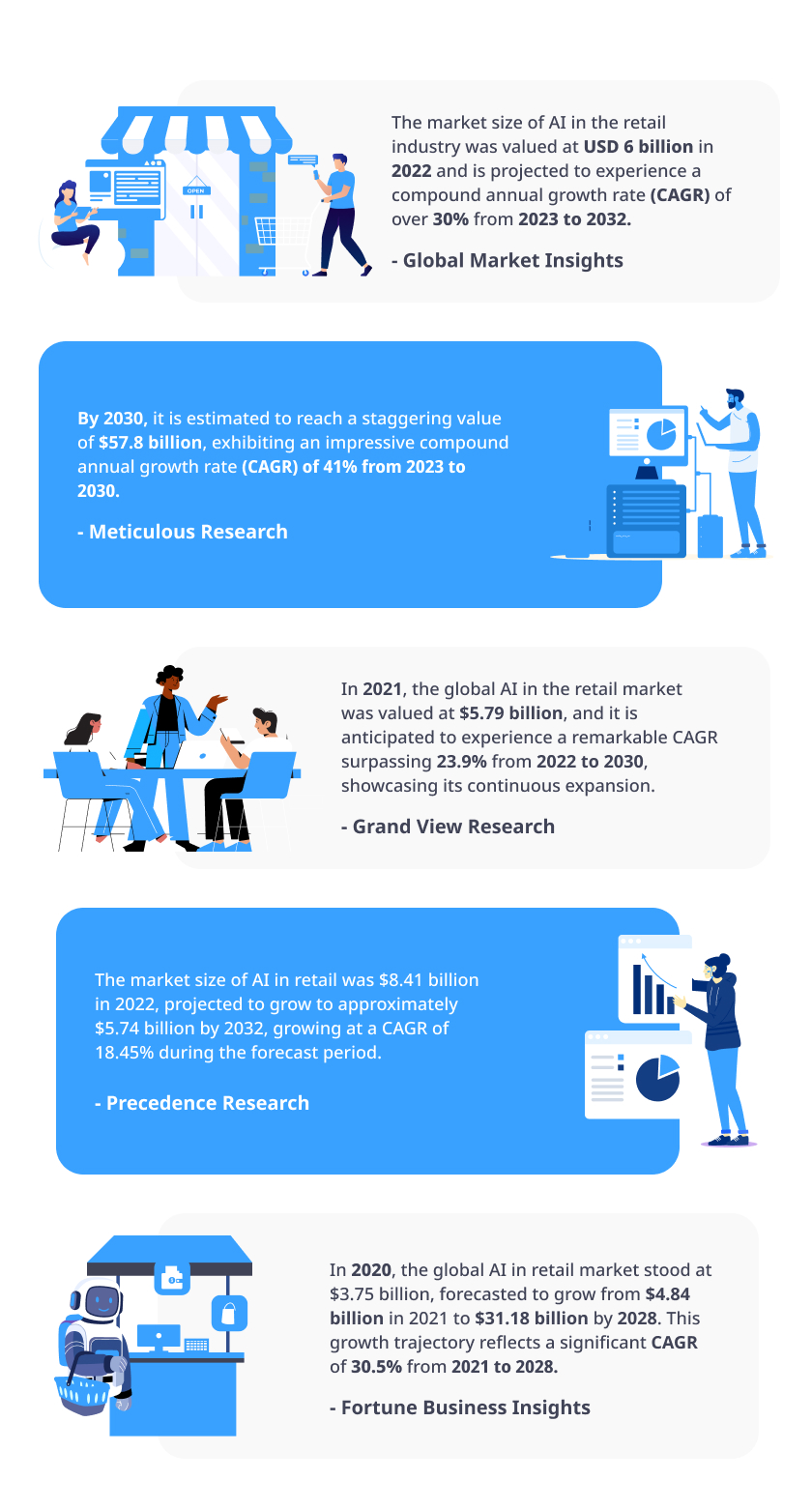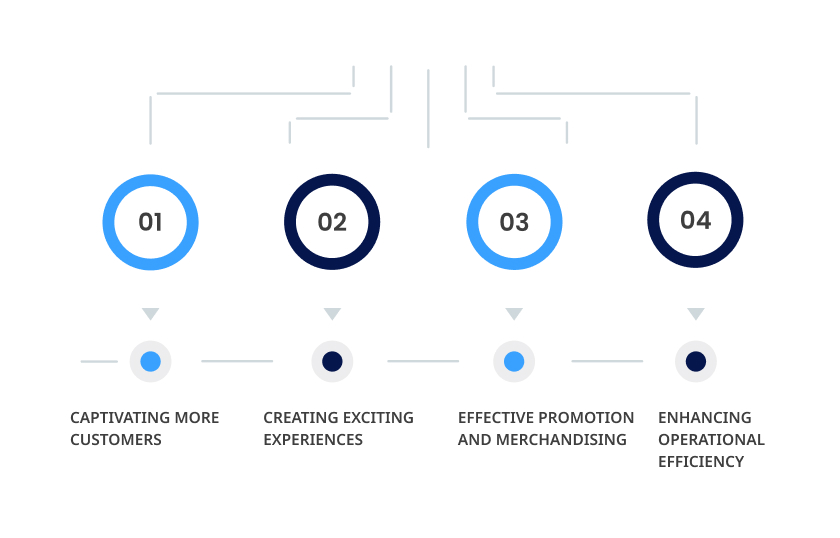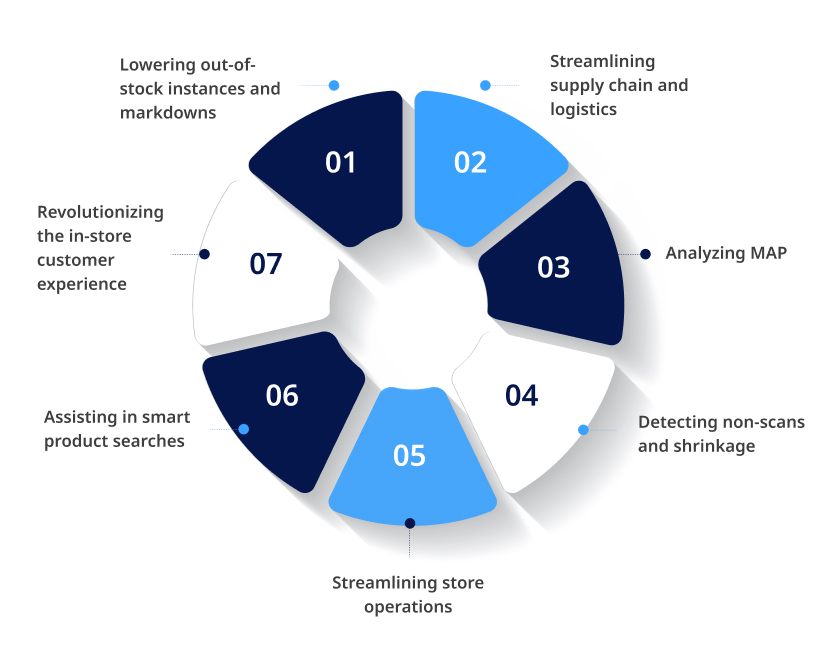Artificial intelligence has transformed the retail industry, revolutionizing how we shop. As a result, the retail landscape is undergoing a considerable transformation.
A prime example of AI’s influence can be found in the heart of Seattle with Amazon Go, a disruptive retail concept that has gained immense popularity since its launch in 2018. Amazon Go’s grab-and-go model, powered by AI, allows customers to download the app, select items from the shelves, and leave the store. The technology automatically tracks and charges customers for their purchases, eliminating the need for traditional checkouts.
The success of Amazon Go has inspired other retail giants like Walmart and Microsoft to invest in AI technologies and explore cashier-less retail options. With plans to expand to over 300 stores, Amazon Go is set to become a major trendsetter in the retail industry, showcasing the potential of AI in transforming the shopping experience.
However, AI’s impact on the retail industry extends beyond cashier-less stores. This blog will explore how AI shapes the retail landscape, examining real-world use cases and highlighting its transformative power.
AI in Retail Industry – Market Overview
Having explored the role of AI in the future, let us now navigate deeper into the reasons behind the emergence of AI in the retail industry.
What are the Advantages of AI in Retail?
The integration of Artificial Intelligence and Machine Learning solutions has revolutionized the retail industry, bringing forth a plethora of benefits that enhance operational efficiency, improve customer experiences, and drive business growth. Let’s explore four primary advantages that retailers can harness through AI:
Captivating more customers: AI-powered retail solutions enable retailers to provide seamless customer support in various scenarios, from automated checkouts to mood tracking. By leveraging AI, retailers can deliver personalized and immersive shopping experiences that resonate with customers, ultimately attracting and retaining a larger customer base. The result is an enhanced customer experience and increased customer loyalty.
Creating exciting experiences: Retailers must offer differentiated products and compelling services to stay competitive and engage customers. AI, mainly through predictive analytics, empowers retailers with valuable market insights, enabling them to lead with innovation rather than merely reacting to changes in the industry.
By understanding customer preferences and trends, retailers can curate unique experiences that captivate consumers and foster brand loyalty.
Effective promotion and merchandising: AI in retail drives marketing and merchandise planning, empowering retailers to segment customers, generate targeted content, and execute precise advertising programs.
With AI, retailers can optimize promotional strategies, personalize offers, and ensure optimal merchandise planning to maximize sales and revenue. For instance, retail giant Walmart utilizes AI to analyze competitors’ offerings and aims to optimize its product mix by employing robotics to scan store shelves.
Enhancing operational efficiency: AI automates routine tasks, freeing up valuable time and resources. Additionally, AI in retail supports complex operations by optimizing labor scheduling, tracking deliveries, and planning efficient routes.
By leveraging AI-powered algorithms, retailers can streamline operational processes, minimize costs, and improve overall efficiency, allowing them to focus on strategic decision-making and delivering exceptional customer experiences.
Ways AI is Disrupting the Retail Industry
AI is revolutionizing the retail industry by disrupting various aspects of the traditional brick-and-mortar retail model. Here are some key areas where the combination of retail and AI is making a strong impact:
- Streamlining supply chain and logistics: AI-powered solutions optimize supply chain processes by predicting and reacting to changes in demand, inventory levels, supplier capabilities, and customer needs. This leads to improved productivity, timely deliveries, and increased revenue. Retailers benefit from lower operational expenses, enhanced demand forecasting, improved production planning, and reduced freight costs.
- Lowering out-of-stock instances and markdowns: AI solutions enable retailers to optimize inventory management by analyzing sales patterns and minimizing safety stock usage. By accurately allocating and replenishing inventory, retailers can reduce instances of out-of-stock items and minimize the need for seasonal markdowns. This leads to cost savings and improved profitability.
- MAP analysis: AI in retail helps monitor and prevent violations of Minimum Advertised Price (MAP) policies. By tracking and monitoring products in real-time, retailers can ensure compliance with MAP pricing, protecting their brand reputation and revenue.
- Revolutionizing in-store customer experience: AI technologies, such as smart mirrors and cashier-less payment systems, enhance the in-store customer experience. Smart mirrors allow customers to try on clothes virtually and explore additional options, while cashier-less systems reduce queues and improve convenience.
Real-time stock monitoring helps ensure shelves are well-stocked, and AI-powered assistants can provide personalized recommendations and assistance.
- Detecting non-scans and shrinkage: AI algorithms and computer vision technology can analyze video feeds to detect instances where products are left unscanned during checkout. Retailers can minimize non-scans and reduce shrinkage by alerting checkout staff in real-time.
- Smart product searches: AI in retail simplifies product searches for customers by allowing them to photograph an item and search for retailers selling it online. Machine learning algorithms classify and sort products from various merchants, making search and comparison easier.
Integrating AI into retail transforms how retailers operate, engage customers, and optimize their businesses. These examples demonstrate how AI is reshaping the retail landscape, paving the way for enhanced customer experiences, cost savings, and increased competitiveness.
How can Vinove help in your AI Retail Journey?
Harnessing the power of AI in retail is crucial for staying competitive and meeting customer expectations. At Vinove, we understand the immense benefits that AI can bring to your retail business. Our highly experienced professionals are dedicated to helping you navigate the complexities of AI implementation and revolutionize your retail operations.
With our expertise, we can assist you in leveraging intelligent AI-driven solutions tailored to your business needs. Whether you want to optimize supply chain management, enhance customer experiences, or streamline operations, our team works closely with you to develop innovative AI solutions that drive results.



